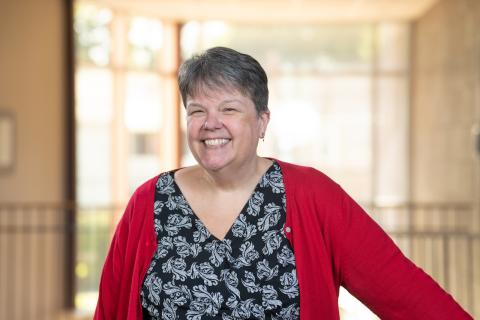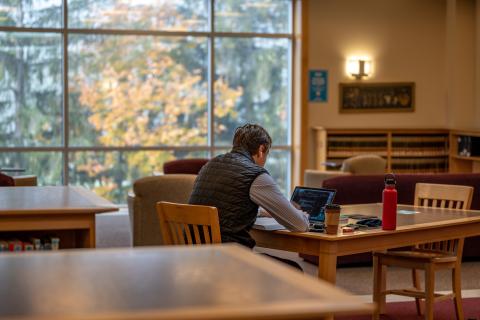UNH Franklin Pierce Librarian Kathy Fletcher Researches Bias in Casebooks; Presents at at Two Panels

As Kathy Fletcher understands it, students enter law school with the idea that the study and discipline of the law will help remove the bias from their thinking.
But that is not always true, as Fletcher has asserted through her research on bias in casebooks. The reference and public services librarian at UNH Franklin Pierce Library is the author of a 2021 article — “Casebooks, Bias, and Information Literacy: Do Law Librarians Have a Duty?” — that explores the issue in depth. And in July, Fletcher presented her findings at the American Association of Law Libraries (AALL) Annual Meeting in Denver, Colorado.
“Unmasking Bias in Casebooks: From Theory to Praxis” (July 18) was the first of two panels on which Fletcher served. For this past panel, she was joined by Nicholas Mignanelli, the research and instructional services librarian at Yale’s Lillian Goldman Law Library, in a panel moderated by critical legal information literacy expert Yasmin Sokkar Harker. The second panel in which Fletcher participated explored law librarianship and scholarship
“When a professor puts together a casebook, and edits the cases therein,” Fletcher explains, “they pick information they feel is important. However, there is plenty of information left out, which the court included in its analysis. My argument is that what a student doesn’t see in a casebook may skew his or her view about the actions and opinions of the court. And, what prompts the author when editing cases? His or her own (conscious and unconscious) biases.”
Fletcher’s pursuit of answer on this topic have been self-initiated, but were sparked by UNH Franklin Pierce students’ perspective that the late Professor Calvin Massey showed no bias in his teaching. That opinion caught Fletcher’s attention.
“I knew Professor Massey had written several casebooks and it got me thinking,” Fletcher recalls, “Are other casebooks obviously biased? After looking at them — and deciding probably, yes, they were all biased — it seemed important to show folks that. My point is not that the books are biased toward or against a particular political viewpoint, it’s that students need to realize the bias exists at all.”
Fletcher says she received tremendous support from Professor Sue Zago, her supervisor at UNH Franklin Pierce, who encouraged her to pursue her research. Many other professors also have helped her along the way, and she is grateful for them all.

Fletcher’s second panel (July 19) involved law librarianship and scholarship. She believes that published scholarship allows librarians to be part of professional conversations that range from teaching to social justice to legal publishing to database search algorithms. The AALL Annual Meeting discussion aimed to inspire librarians to pursue scholarly writing projects and expose them to strong examples of work published by their colleagues.
“Reading published scholarship broadens our scope and makes it more inclusive,” she says. “It has certainly broadened mine.”
Because of Fletcher’s own scholarship, the research and instruction librarians at the Lillian Goldman Law Library revised the case briefing session conducted during JD orientation at Yale Law School to include discussion of casebook bias. Yale’s Mignanelli will talked about that at the July 18 bias panel. Citing an information literacy plan that UNH Franklin Pierce developed from the American Association of Law Libraries Law Student Competency Standards, Fletcher says she takes seriously her role in educating law students about the materials they are consulting.